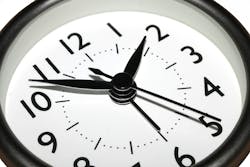Good news, everybody: We turn the clocks forward an hour this weekend, which means it will remain lighter longer into the evenings. Bad news, everybody: This change will mess with our sleep schedules and make us lose out on a prime hour of weekend time.
My sleep schedule is all out of whack. I’ve been getting less than the recommended 7-minimum hours of sleep all week, and I also didn’t do myself any favors by stumbling out of bed today at 4:00 a.m. to make it to a volunteer event. Sure, it was for a good cause, but right about now I feel like I’m running entirely on caffeine fumes.
This weekend, my sleep schedule may get even more confused thanks to Daylight Saving Time. This time change has been connected with an uptick in workplace injuries, health implications, traffic crashes and more.
Sleepy’s (as in the mattress company) is proposing a solution to soften the blow of Daylight Saving Time sleep deprivation: shift the time change from 2:00 a.m. Sunday morning to 2:00 a.m. Saturday morning. According to Sleepy’s, nearly 70 percent of Americans agree that moving Daylight Saving Time back one day could help combat that post-Daylight Saving Time sluggishness so many experience the Monday after the time change.
Sleepy’s even created a petition regarding this change, and the company intends to submit it to the U.S. Department of Transportation for consideration. (Don’t worry, no mattress purchase is required to sign – although as of this writing, the petition has received only 74 signatures. The goal of 1,000.)
“As advocates for healthy, high-quality sleep, we believe in doing everything in our power to improve our national sleep deficit,” says Jeff Lobb, Sleepy’s chief marketing officer.
Whether Sleepy’s is successful in their petition to change Daylight Saving Time or not, the regularly scheduled Sunday 2:00 a.m. change definitely is in effect this year. Here are some tips to soften the “clock shock” of the change:
- Change it up. Buy a new alarm clock or change the tone on your old one or whatever device you wake with. This way, you already have “sleep on the brain” which can help you prepare for the adjustment.
- Unhand your tech toys. The bright blue light emitted from some devices can keep you awake for hours. Some people are so wound up they even text in their sleep. So drop it.
- Friends don’t let friends drive drowsy. If you’re very groggy the morning after Daylight Saving Time begins, consider delaying your drive to work until you are alert and awake. Your safety and that of those around you depend on it.
- Bright is right. Expose yourself to bright, natural light when you awaken. Light is the primary cue for our body to wake up. It suppresses the release of melatonin, the sleep hormone.
- Early to eat, early to rise. Consider eating dinner earlier and backing up your nighttime routine for a few days to allow your body to readjust to the time change.
- Embrace mood lighting. Dim the lights in the evening to give your body a signal that you are nearing bedtime.
- Get moving. Exercise with a brisk walk or run in the morning or during the day to adjust to the advancing clock (just not within several hours before bedtime).
- Get the buzz about coffee. Avoid caffeine after about 4:00 p.m. and reduce alcohol consumption in the hours before going to sleep.
- Find your happy place. Create calming rituals for bedtime such as taking a warm bath or practicing breathing techniques.
Whatever your sleep schedule, stay safe this weekend. Sweet dreams, everyone.
About the Author
Laura Walter Blog
Senior Editor
Laura Walter is senior editor of EHS Today, a Penton Media Inc. publication. She is a subject matter expert in EHS compliance and government issues and covers a variety of topics relating to occupational safety and health. Her writing has earned awards from the American Society of Business Publication Editors (ASBPE), the Trade Association Business Publications International (TABPI) and APEX Awards for Publication Excellence.
